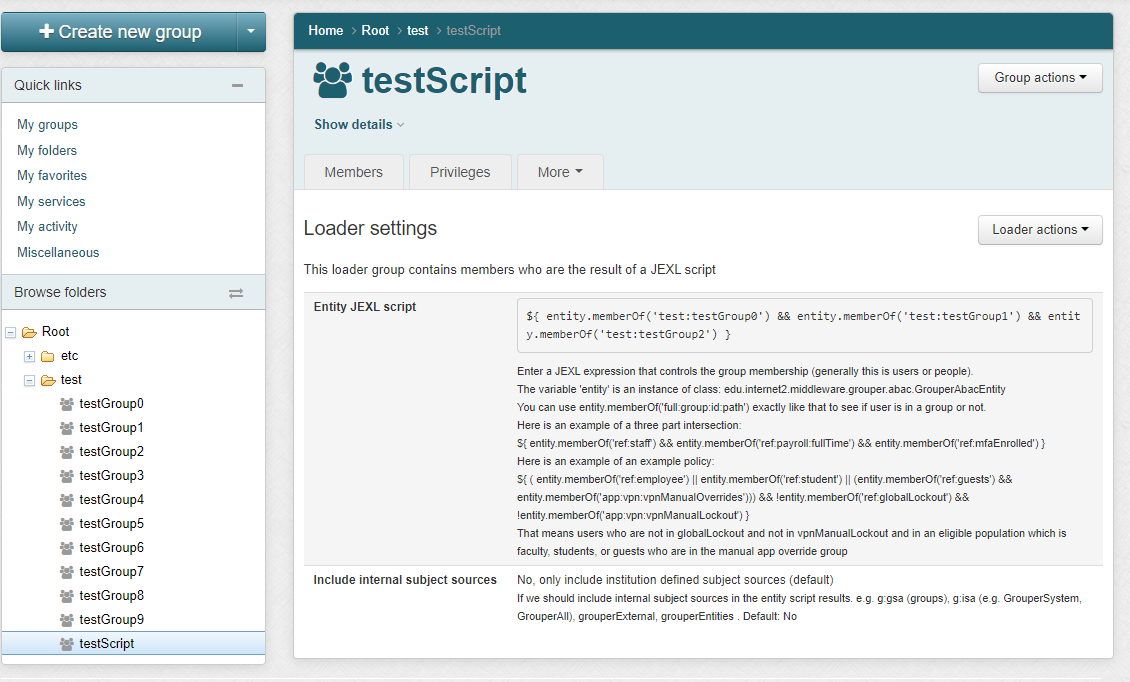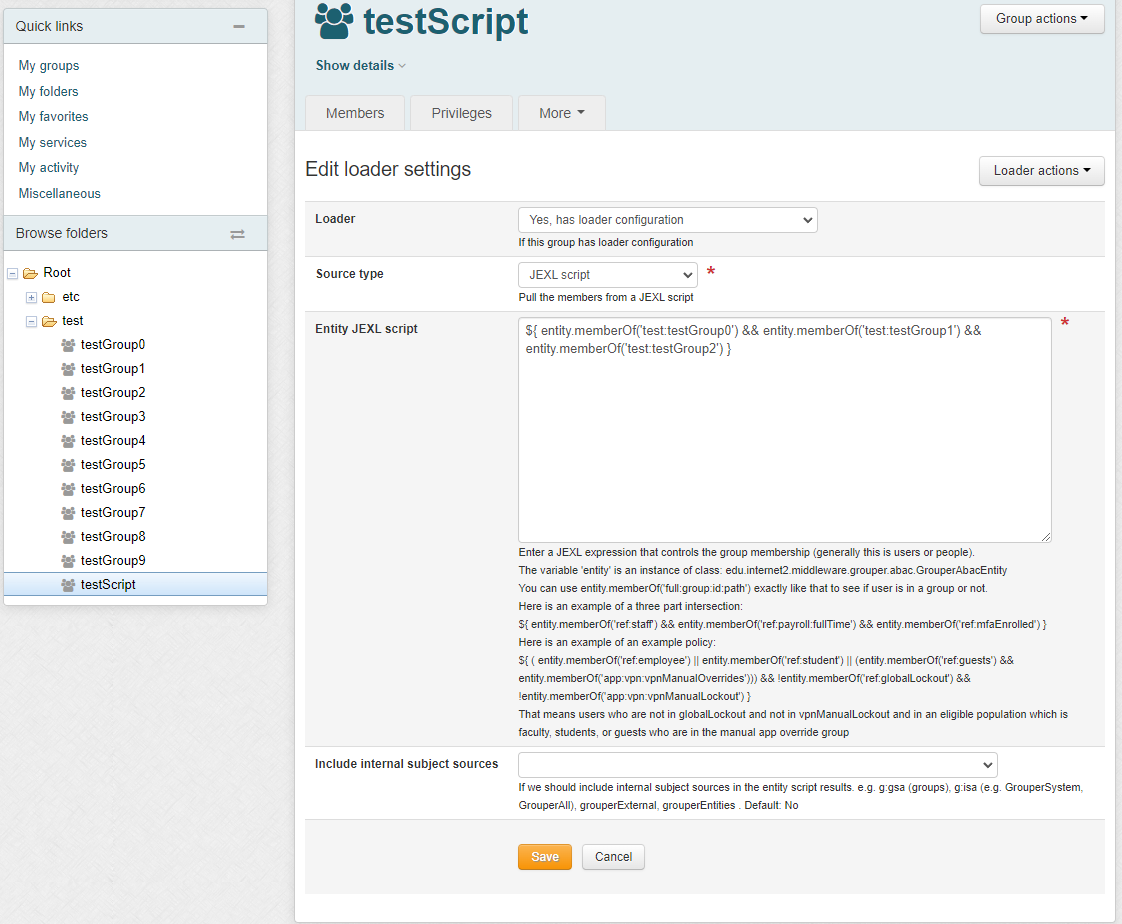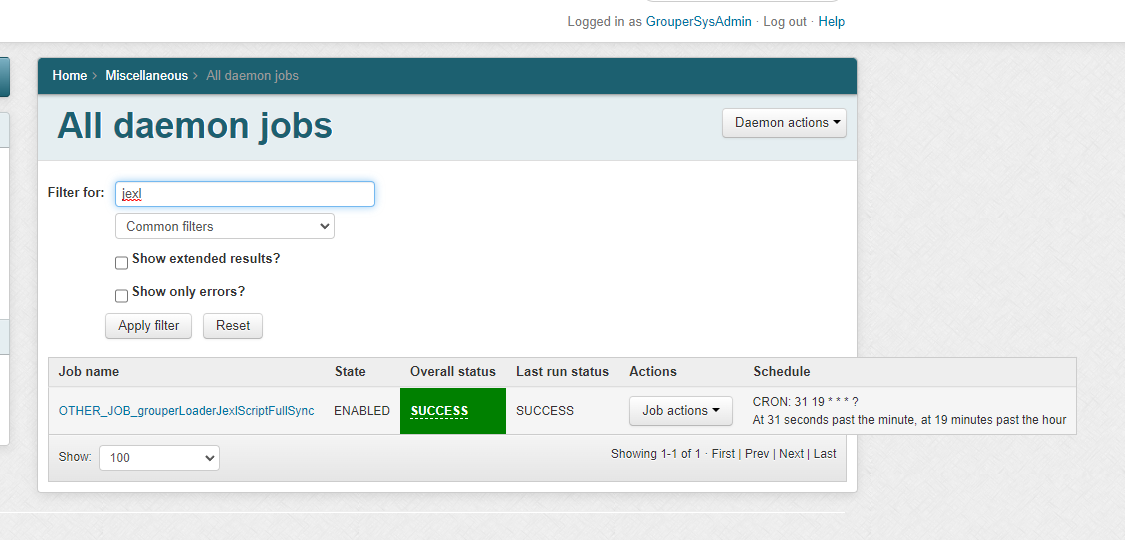...
| Info | ||
|---|---|---|
| ||
For more info, see the blog on Attribute Based Access Control with Grouper, from February 2022 |
This is Expression language (JEXL) scripts facilitate implementing the part of ABAC that defines who is included in a policy based on attributes of those users. Other parts of ABAC such as resource attributes or environment attributes can be taken into consideration with Grouper permissions or by the service which has protected resources.
...
- Reduces pre-loaded rollups that might not be used
- You don't need a loader job for each one of these groups
- Any Grouper user could edit the policies if they can READ underlying groups. The expressions are secure (future state)
- The memberships of the ABAC groups are near real time based on an intelligent change log consumer (future state)
- You can have a UI to help build it and give good error messages
- Could visualize the policies. Perhaps could be integrated into existing visualization (future state)
- This solves the issue of composites with any number of factors
UI to configure
Daemon screen
Note in Grouper v2.6.6 you need to wait an hour after changing a script, or run the JEXL script loader full job. In the future we will have an incremental and run the full nightly. Note: there is one full daemon that handles all of the JEXL script ABAC groups. You do not add this, it is built-in
Scripts
The script can only be written by people who can READ groups in the script and UPDATE the owner group. Since this is actually a JEXL script (not a JEXL expression), so you could have multiple lines, variables, conditionals, etc
...
| Expression | Description | ||
|---|---|---|---|
| Three part intersection. Full time staff in MFA | ||
| Example policy That means users who are not in globalLockout and not in vpnManualLockout | ||
| Exclusive OR This is VPN users not in MFA and MFA users not in VPN: |
How it works
There are some trade-offs with performance and resources. This is the current implementation. It is optimized to reduce run-time. It does use a lot of memory, though that was a consideration.
- Sees which groups are in the script
- Get the memberships of the owner groups and all script groups (only get the memberId, sourceId, and groupId)
- Consider if configured to include internal subject sources (adjust the membership lists)
- For each member of either the owner group or the script groups for that owner
- Setup the variables for a JEXL script based on the bulk queries
- Evaluate the script
- If the result does not match the current state of the membership, add or remove the member from the owner group
- If a script evaluation fails, proceed with the job
TO DO
Allow common reference groups to have user friendly labels
Code Block e.g. employee instead of ref:employee
- Do not allow plurals of labels, and absorb plurals. e.g. "member of employee" same as "member of employees
- Same for case differences
- Absorb smart quotes
- Give a warning (validation) and suggestion when parens are needed
- alow group friendly names, uuid, idIndex, case issues, etc to be used but converted into the id-path
- Document common allowed reference groups and syntax on the script editing page
- Allow natural language to be converted into JEXL
e.g.
Code Block FROM Member of employee, and member of app:jiraAdminsManualTO ${entity.memberOf(‘ref:employee’) && entity.memberOf(‘app:jiraAdminsManual’)}e.g.
Code Block FROM Has affiliation attribute with name of staff and dept of english, but not a member of lockout TO entity.hasAttribute('affiliation', 'name==staff && dept==english') && entity.notMemberOf('ref:lockout')
- Load groups as members
- Add incremental job
- Unit tests
- Better validation
- More methods to call (other than hasMember)
- Add subject attributes e.g. from global attribute resolver
- Failsafes
- Add delegated admin based on READ of groups
- Visualization
- Add more counts of total memberships etc
- See if comments can be included in scripts
- See if we can replace composite type with immediate in membership table if replacing a composite with jexl script
- Have a confirm screen that tells the user information about what will happen (tie into visualization)? (have a progress page)
- Add UI to configure scripts?
- Test button while writing to see if valid (maybe that does counts too)
- Add dependency graph for precedence or recalcs in full sync
- Do not allow circular references
- Identify full syncs to be hourly or daily
- Allow single quotes or double quotes when parsing scripts
Entity data fields
Setup your entity data fields and use that data in JEXL scripts. This data can come from LDAP or SQL
...
umichAAAcadProgram: {acadCareer=GBA}:{acadProg=00018}:{acadPlan=0010MAC}:{campus=A}:{progStatus=AC}:{admitTerm=2410}:{admitTermBegDt=2022-08-29}:{expGradTerm=}:{degrChkoutStat=}:{acadCareerDescr=Graduate Business Admin}:{acadPlanDegree=MAC}:{acadPlanDescr=Accounting MAcc}:{acadPlanField=0010}:{acadPlanFieldDescr=}:{acadPlanType=MAJ}:{acadPlanTypeDescr=Major}:{acadGroup=BA}:{acadGroupDescr=Ross School of Business}:{acadProgDescr=Accounting MAcc}
umichHR: {jobCategory=Faculty}:{campus=UM_ANN-ARBOR}:{deptId=304000}:{deptGroup=MEDICAL_SCHOOL}:{deptDescription=MM Orthopaedic Surgery}:{deptGroupDescription=Medical School}:{deptVPArea=EXEC_VP_MED_AFF}:{jobcode=201000}:{jobFamily=10}:{emplStatus=A}:{regTemp=R}:{supervisorId=12345678}:{tenureStatus=TEN}:{jobIndicator=P}For a single my_people_affiliation table, having a column for each distinct keyword would require about 70 columns. In any given row, most columns would have a null value. At the other extreme, we could use a single column for the affiliation data, so the columns would be employee_id, affiliation_name, affiliation_value. At this extreme, most queries would require substring matching. Would a structure between these make sense? Is a separate table for each affiliation better? (Dont worry about a table with all data)
Parse expression with JEXL (for Grouper developers)
| Expand | ||||||||||||||||
|---|---|---|---|---|---|---|---|---|---|---|---|---|---|---|---|---|
Feed the expression through this simple program
Output
Grouper can take that object model and see which group and subject attributes are related, print out a nice analysis of the policy, and know which policies are affected by real time changes Expression 2: campus is palmer or southern, or the term is current with some overlap
Expression 3: primaryAffiliation is faculty or staff and dept is physics or math
|
Analyze policy
To confirm a policy is correct, a long form translation of the policy can be displayed along with group names and group counts (future state)
Visualization
This is a complicated topic since it is parsing a programming language.
...
We need to get a list of sample policies people want to use so we can make sure we are going in the right direction.
Full sync
A nightly full sync will occur. The incremental sync should stop. Make sure all the loaded groups are up to date.
Incremental sync (future state)
An incremental change log consumer can
...



